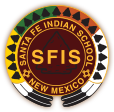Academics
Educator Profiles
View AllMike Pecos
Disciplinarian
MS Academics
Cochiti Pueblo

I have attended New Mexico State University and New Mexico Highlands University and have worked at SFIS for 23 years. Here I am the Students’ Rights and Responsibilities Coordinator. I have also served as Lt. Governor for Cochiti Pueblo and am a Tribal Council member, which is a lifetime position. I am also a Cochiti Keres language teacher for the Cochiti Summer Language Program.
At SFIS, I work with all the students, and the core values that we use here guide that work. These are the core values that many of us grew up with—a lot of people come to this school thinking it is specifically Native American, but it’s really about life values and represent something all people can relate to. Even through the many years and generations of federal Indian policy and assimilation efforts, our core values are the most critical part of who we are. I think that SFIS has a reputation that we are the caretakers, we are compassionate, and we are all those things that the community teaches us. And as a staff person doing what I do here, I want to embody that, which is really the Santa Fe Indian School. It’s all about tradition—you choose to do things in your life because of what you’ve seen in your family from your aunties, grandmas, etc. Parents and teachers alike buy into all these values, and I don’t want for them to come here and experience anything different. I hope that at some point we can all have that way of thinking so that students don’t have any experience other than coming to their other home, this school.
Making the transition and seeing the history of the Indian school move from the Indian school that was to the Indian school that is now is a vision that in many people’s eyes was too far-fetched. And now we’re here and actually living it. Our campus is a beautiful place that had a lot of thought and hope put into it. For example, in the architecture, you don’t see any brick or sharp corners in the buildings. It’s a place that is warm and represents community to us.
I know that tradition and culture are strong for me. They are one—they go hand in hand. If you’re not engaged in your tradition and your culture, well, that’s where respect is derived from. That’s where everything emerges. Like the symbolism of corn and what it means to us—it’s life, it sustains our people, and you wouldn’t know what it symbolizes at a very deep level unless you are engaged in the teachings of your people. Tradition and culture teach us respect, and respect is simply how you live your life. It’s a big word, but language, for example, and living language is respect, you live respect through those things.
I am passionate about our Native language, but also songs. I compose traditional songs for our community activities, so that’s my passion. I can be having the worst morning or worst afternoon, give me music and I am okay. For SFIS students, I wish that the school would become not only what our administrators have said—that this is the 20th Pueblo—but I also wish that the school would achieve all the substance that makes a Pueblo community what it is and all those things that come along with it—for everybody to be compassionate, respectful to each other, regardless of status here.
